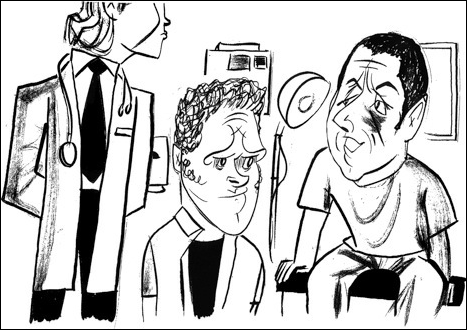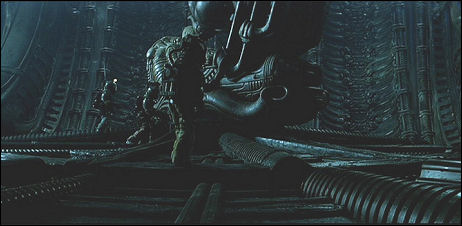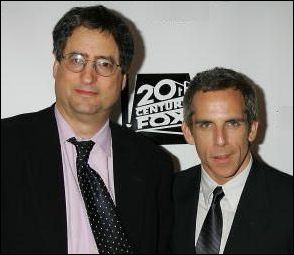Congrats to Team Movieline for having scored and posted an apparently legit Ben Stiller in-house short that mocks the coarse, corporate and highly invasive mentality of 20th Century Fox. Stiller’s Red Hour Films has been on the Fox lot since last February, and one can deduce from the short (which I couldn’t figure how to embed) that Stiller isn’t entirely charmed by the vibe.
Stiller’s key money quote is as follows: “[Fox CEO] Tom Rothman is so far up my ass, he’d probably have to send Jim Cameron up there with one of his 3-D underwater cameras to pull him out, and he’d still be hangin’ on for dear life.”
A time-frame issue needs to be considered though. Stiller says directly before the Rothman line that the reason he spent “$800,000 on this film” is “to talk about Red Hour moving from this shitty office to its new home at Fox.” Then he says rafter the Rothman line that he’s “so excited to be coming [to Fox].” In other words the short was made either in anticipation of or concurrent with Red Hour’s move, and not based on day-to-day experience there.
“I’m going to go out on a limb here and assume [this] Ben Stiller video was not meant for public consumption,” writes Movieline‘s Seth Abramovitch, “but as is the case with sex tapes, if you don’t want your production company’s lightly incendiary and completely hilarious inside jokes to leak — don’t make ’em.
“Back in February, Stiller’s production company Red Hour Films left its home at DreamWorks and took up residence at 20th Century Fox. Having been provided this footage anonymously and with no background, we’re going to assume the short film you’re about to watch was circulated among Red Hour employees and close friends to celebrate the move.
“Framed as a vintage” — i.e., ’60s or ’70s era — “industrial film, Stiller walks you through the transition, first by defining what Red Hour is: the producer of such quality entertainments as Zoolander, Blades of Glory, Tropic Thunder and…uh…Jaws, all funded by their proprietary ‘Kosher Meat Condom’ technology.”
In addition to announcing a maneuver by his lawyers to have himself legally become Newscorp owner Rupert Murdoch‘s adopted son, Stiller announces an intention to rename his company Red Foxx Entertainment. He then declares that the operation is grounded upon “charisma, personal magnetism and a deep yearning for huge quarterly profits.”
It would appear that Stiller was suffering through the usual pressure to generate popular/profitable features (“I’m gonna kill me!”) and decided to make the short as a creative emotional-venting exercise. I think it’s pretty terrific — the sort of thing that Stiller used to crank out during the glory days of the Ben Stiller Show, which ran on the Fox Network back in ’92-’93 but was cancelled after only 12 episodes.







